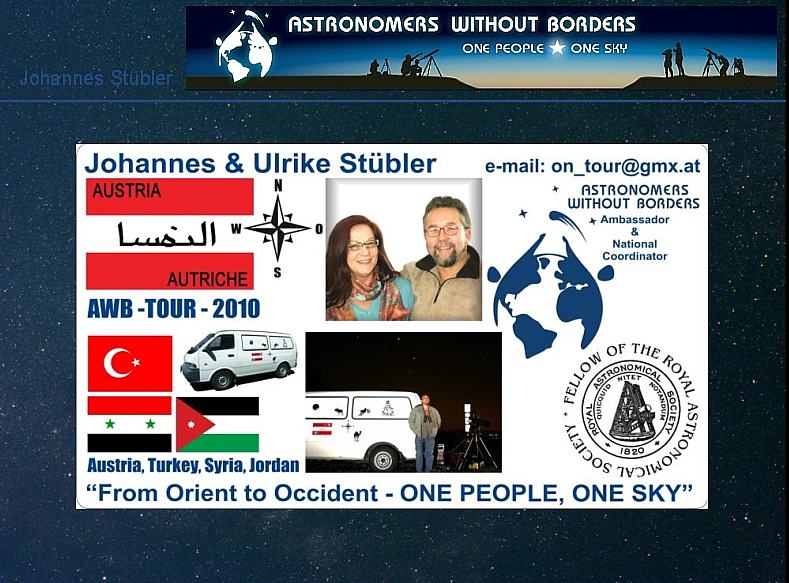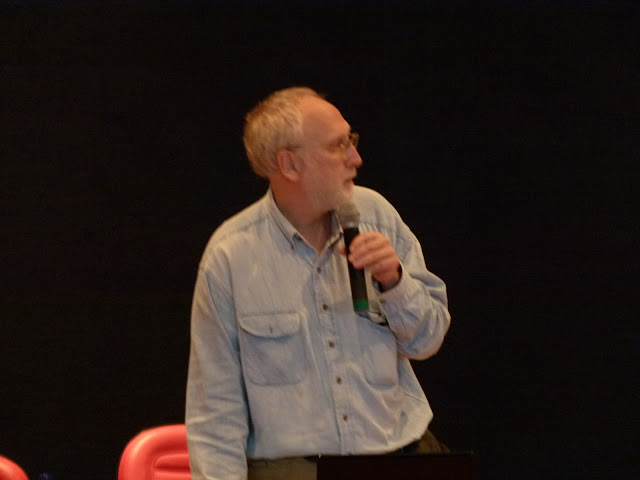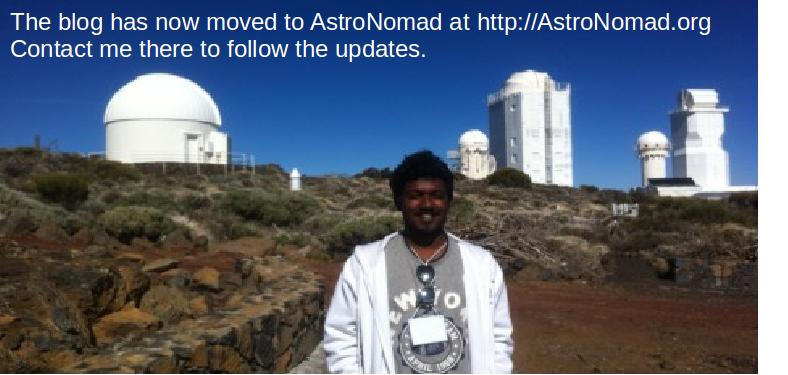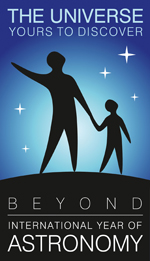It's always been a pleasant experience cherishing past memories with great happenings. Even now, just a month and a week later, I can be happy going though my own flashback of 5th International Meeting on Astronomy and Astronautics held in Brazil. Blogging requires to be specific sometimes and in this post I will recall about some interesting happenings took place during the 3 days from 19th to 22nd of April 2012. You can always check about the
pre-events that preceded the 5th International Meeting on Astronomy and Astronautics and also the event
schedule/ program.
I had the pleasure of participating in the 5th International Meeting on Astronomy and Astronautics as an invited speaker as the president of the
Mathematical & Astronomical Society of University of Colombo. Having arrived in Brazil for the first time, and being though my
first 2 days in Brazil I was slowly having my lessons and learning about the culture and the people, who proved to be very dynamic, spontaneous and friendly as I was progressing with rest of the stay. The hospitality I received was amazing, Professor Marcelo was always making sure I was doing fine and helped me in whatever possible way he could have had, and later as I was traveling in some parts of the Brazil, it proved to be no exception, as the Brazilian hospitality I received was at its best.
 |
| My Visa for 5th International Meeting on Astronomy and Astronautics |
Well, Let's get straight into the context, 5th International Meeting on Astronomy and Astronautics started on the 19th morning inside the cinema hall of the Shopping Boulevard in
Campos dos Goytacazes. Saying something about the hosting city, which is usually referred to as Campos, it is located almost in the middle between the cities of Vitória and Rio de Janeiro, which are the metropolitan capitals of Brazilian states of Espirito Santos and Rio de Janeiro respectively. I think you would get to Campos in a 3-hour driver from Rio. In Brazilian Portuguese, Campos means fields and they say Gaytacazes is an Indian tribe that used to live in the area and hence the name Campos dos Goytacazes.
 |
During the Opening Ceremony of 5th International Meeting on Astronomy and Astronautics at Shopping Boulvard, Campos dos Goytacazes, RJ, Brazil - People pictured from right to left are, Professor Marcelo Souza from Campos dos Gaytacazes, Brazil, Tamas Ladanyi from Hungary, Johannes Stübler from Austria, Andrea Sanchez-Saldias from Uruguay, Prasanna Deshapriya from Sri Lanka, Dirk Ross from Japan, Dimitri Gadotti from ESO, Douglas -A representative of Shopping Boulevard, 2 other personnel from Campos dos Goytacazes city.
| |
|
|
|
 |
| The audience at the same time: The audience consisted of students, teachers, and citizens of Campos dos Goytacazes |
 |
| Professor Marcelo Souza, speaking at the opening ceremony |
Here you can see the happy face of Professor Marcelo Souza, who is the chief organizer of 5th International Meeting on Astronomy and Astronautics. Also pictured is the Hungarian astro-photographer Tamas Ladanyi from the TWAN- The World At Night project.
 |
| Just before the start ! |
You may see here how crowded the cinema hall was getting just before the start of the opening ceremony. Here you can see Professor Marcelo and some of the members of the
Luis Cruls astronomy club as well. I must mention that these guys did an awesome job behind the scenes with so much untiring efforts towards the success of the 5th International Meeting on Astronomy and Astronautics. Thus it is with great gratitude I mention them here for despite their young age they delivered really serious and tough work. I'm really happy to have enjoyed their company throughout my stay in Campos, not only during the meeting, but also prior and post to the event.
 |
| Tamas Ladanyi from Hungary - TWAN (The World At Night) |
Here you see the first speaker of the 5th International Meeting on Astronomy and Astronautics, Tamas Ladanyi, an astrophotographer from Hungary who also works for the TWAN, specialized in the landscape photography. During his session he showcased his experience with astrophotography, which was vivid with a lot of fine combinations of skies and landscapes. One of the interesting pieces of his work was the photograph titled in Spanish "Mira mira Mira" (Mira olha Mira em Português) where his daughter Mira, is looking at the red-giant star Mira (a star in the constellation Cetus).
 |
| Professor Marcelo performing the interpretation task during the astrophotography workshop of Tamas Ladanyi |
During the evening of the second day he also conducted a workshop on using equipment/ gear for astrophotography, touching down many technical specs as well. Then he led an expedition into a darker and distant area of the city with Professor Marcelo to flee from the lights of the city to get involved with more hands-on activity, where he demonstrated exactly the very steps that one needs to follow in taking a decent photo of some celestial object with the inclusion of a landscape as well. I was able to join this expedition and get more insights into my understanding of this beautiful branch of astronomy. Below you will see a picture that Tamas made at the end of the observation session at this remote location, along with all the participants.
Have a thorough look at the southern skies !!
 |
| Southern skies and the participants of the Tamas Ladanyi's workshop - Tamas himself, Professor Marcelo Souza and Johannes Stübler from Austria are also presented in the picture. (Photo Credit : Tamas Ladanyi) |
|
 |
| Me and Tamas Ladanyi |
The second speaker José Carlos Diniz, a Brazilian astronomer from Rio de Janeiro spoke about the difficulties that one must undergo when doing astronomy in Brazil as well as about some determined individuals who have proved themselves exceptional, still to continue practicing astronomy in Brazil despite the various issues. The humorous sense he developed whilst presenting himself added more vibe to his presentation bringing about the ideology of his talk "Astrophotography in Brazil, the victory of passion".
 |
| One of the funny slides of José Carlos Diniz (Photo Credit : Johannes Stübler) |
It was really inspirational as José went on to particularly mention how difficult it was for him and his colleagues to find dark areas for observations in Brasilia, the capital of Brazil and how they finally managed to find better areas in the end in the same vicinity with adventures mixed with huge passion, and love for the astronomy.
The next was the presentation of Johannes Stübler, the National Co-ordinator of
AWB (Astronomers without Borders) from Austria. Johannes gave an account about his ambassador role in "Living the Idea", traveling from Linz, his home city in Austria across Jordan, Syria and Turkey, promoting the astronomy and trying to get more people, met on the road to look at the skies and get interested. I was convinced that it is a great coincidence that Johannes Stübler also comes from the same city that Johannes Kepler was once living, as I was gathering more information.
 |
| Astronomy Outreach - from Orient to Occident (Photo Credit : Johannes Stübler) |
As I had the chance of having the company of Johannes during the meeting, we were sometimes sharing our ideas and experiences and it was fascinating to hear about the AWB Beer they had in Austria for the
GAM (Global Astronomy Month) and I think it shows the innovation and creativity, blended with popularizing astronomy among people.
 |
| A souvenir I received from Johannes Stübler | |
 |
| Me and Johannes Stübler, he presented me the gift of the raffle draw :) |
Here is another picture taken during the first day of the meeting. Pictured are José Carlos Diniz, Patrick - the Portuguese<>English interpreter throughout the meeting, Norma Reis from Brasilia, Brazil and Oscar Matsuura from São Paulo, Brazil. Look at the variety of people that astronomy could bring together !
 |
| Another picture, you add the caption for this ! |
|
 |
| Dimitri Gadotti, a Brazilian working at ESO in Chile, during his presentation |
The talk about the life and work at ESO telescopes in Chile with a focus on E-ELT, ESO's newest challenge, by Dimitri Gadotti was interesting, and curious as I was wondering how they make such great missions possible. It was also my Why for ESO's preference on southern skies, as they produce a lot of sophisticated cutting-edge accessories and equipment in Europe and transport those all the way across Atlantic Ocean and further to Chilean deserts.
“Jorge Marcgrave in Dutch Brazil: his founder role in Astronomy of Brazil and of the New World” - This sounded different for me in the beginning, Dutch Brazil ? Well, as I was through the presentation of Oscar Matsuura, who is a veteran researcher based in São Paulo, Brazil, I managed to figure out answers to my puzzle. He spoke about the pioneering role of
Jorge Marcgrave in astronomy in Dutch Brazil or Brasil holandês as it is said in Brazilian Portuguese and about the influence he had on the people of northern parts of Brazil when they were Dutch colonies. Although I've included the Wikipedia link about Jorge Marcgrave here, I'm more than sure the presentation of Oscar was more resourceful.
 |
| Oscar Matsuura, and me outside the Shopping Boulevard, Campos |
 |
| Attendees for the 5th International Meeting on Astronomy and Astronautics waiting inside the Shopping Boulevard, You can also see the telescopes, multimedia, mobile planetarium, belonging to the Louis Cruls Astronomy Club. |
 |
| Astronomy + Chess : I've always stumbled upon this game whenever I was out of Sri Lanka. I really don't know how I always find a connection with Chess and end up playing it, as the time permits. With me here is Laura from Louis Cruls Astronomy Club with a keen interest in astronomy. |
The second day of 5th International Meeting on Astronomy and Astronautics continued at Campus Guarus do Instituto Federal Fluminense, a new location also close to the city center.
 |
| Dr. Robert Zubrin from United States during his presentation |
First presentation in the morning was that of Dr. Robert Zubrin from Mars Society, US about the project "Mars Direct" which is an attempt to get the man to the red planet in no more than a decade. Dr. Zubrin particularly expressed his idea on why this should be done within a time frame of 10 years and no more. He was quite certain about the potential about the project and I think it wouldn't be too far away the day where there would be Mars colonies, probably within our lifetime provided all works out fine.
 |
| Professor Marcelo & Dr. Zubrin with Monique, Ana, Lucas & Hermerio - First Brazilian Crew in Mars Desert Research Station |
Then followed the report of the first Brazilian crew in Mars Desert Research Station, a facility located in the US. The report was about the experiences of Lucas, Ana, Monique & Hermerio, 4 students of Louis Cruls Astronomy Club who had the chance of visiting Mars Desert Research Station and spending few days there under the crucial conditions, similar to those, to be faced in real exploration activities in Mars. The students were supposed to be crew members, who had different areas to undertake like, geologist, communicator, etc whilst during the stay at this facility. For example Ana, who was in charge of communications had to wait long hours for the feedback from Earth, taking into account the distance between the two planets after she has sent any message/ signal. I believe it was truly an inspiration to all the participants as the students shared their individual experiences. Professor Marcelo also thanked Dr. Zubrin for his involvement in this project and I reckon there would be more chances for the Brazilian students in the future.
One of the other interesting as well as curious sessions to follow was the presentation of
meteorite hunter Dirk Ross from Yamaguchi University, Japan and AWB with the topic "Meteor/Meteorite Soup"
 |
| Here is Dirk Ross, as he presents on "Meteor/Meteorite Soup" |
One of the facts that Dirk mentioned in his talk still echoes in my mind; he went on to say that there had been only few meteorites found in the Brazilian territories and provided the large size of the country, there could be many more meteorites to discover. Later I got to know that Dirk, himself led some expeditions on lookout for possible meteorites along with some other students, and the results were not positive though. Nevertheless I hope they enjoyed the expeditions.
 |
| Dirk is confronted by curious students after his talk ! |
|
|
I don't know how to relate what happened the following evening, We received the NEWS from locals that there had been a meteor crash close to Campos and someone had recorded it as well and had put the
up on Facebook. We were with Professor Marcelo and he was receiving a lot of calls, reporting about this so-called meteor crash. In a different sense it was funny that Dirk Ross had just delivered his presentation about meteorites during the day and he had just had conducted the workshop in the evening on how to look for and identify them, and few hours later we're receiving a lot of reports on meteorite sighting.
, seen being burnt as it was entering the atmosphere. However it triggered some fuss and suddenly a lot of interest and attention was paid to what Dirk was trying to explain in his talks.
Still on the second day there were many other sessions and activities too with the inclusion of variety of events both indoors and outdoors.
Whenever there was a break between the sessions I always tried to talk to fellow speakers and students and learn more about what they do, for I was naturally driven with the curiosity. These times proved to be hard sometimes when I stumbled upon some students who hardly spoke any English. However the universal expression of smile was commonly shared despite the language barrier. Below is one such a situation.
I spoke about the outreach activities of astronomy in Sri Lanka, generally what we do here to popularize astronomy. In addition I also talked a bit about my astronomy career and how IYA2009 boosted my involvement with astronomy outreach. In the picture above, in the slide, I'm seen presenting the annual astronomy magazine "Sigma" of Mathematical & Astronomical Society to the staff adviser Professor Chandana Jayarathne at the 'Star Quest 2011' inter-school astronomy quiz competition held in May 2011. In fact this was a great milestone of my astronomy career as I was the editor of that publication.









































